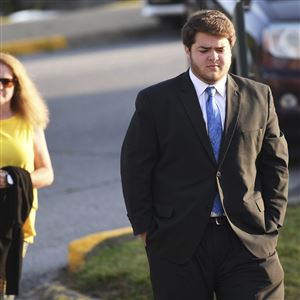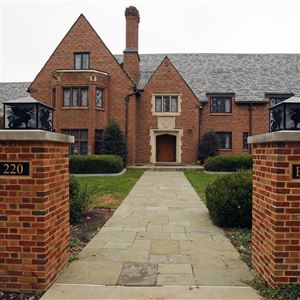New members of Phi Sigma Kappa at Penn State University, Altoona, were “forced to consume alcohol and drugs in excess” in 2013 and faced “confinement and extreme physical activity,” says a report released Tuesday under a new anti-hazing law.
The fraternity was suspended for six years, and 13 students were disciplined, included two who were expelled.
In other incidents the last five years, new members of fraternities and sororities there or on Penn State’s main University Park campus were tied to poles, directed to eat expired food and subjected to other physical or psychological abuse, including licking toes, sleep deprivation and forced exercise such as planks with their elbows atop the edges of bottle caps.
An anti-hazing law enacted following the 2017 death of Penn State pledge Timothy Piazza requires Penn State and other Pennsylvania institutions including colleges and universities to publicly report violations of school hazing policies over the past five years.
Tuesday was the deadline for schools to post their initial institutional reports. From now on, those institutions must update, on Jan. 15 and Aug.1 of each year, reported hazing activity including a description, the accused entity and sanctions imposed.
Penn State, which said it investigated 31 incidents in all, wasn’t alone. The University of Pittsburgh posted to its web site a list of 19 incidents between 2013 and last year, involving various reported violations such as bulk alcohol use, disorderly or lewd behavior and underage possession of alcohol. The most recent case listed was from Sept. 27.
Duquesne University reported seven investigations; the most recent leading to sanctions was last spring.
Carnegie Mellon University said three investigations were conducted, two at sororities and one at a fraternity. The most recent was in April.
Mr. Piazza, 19 and a sophomore engineering student at Penn State, died after suffering multiple falls inside the Beta Theta Pi house in February 2017. The case focused national attention on hazing, as the young man’s parents, Jim and Evelyn Piazza, crusaded for reform.
On Tuesday, Penn State included with its report a summary of campus responses and its position on hazing.
“Student safety remains a top priority,” it read in part. “Under the new act, all organizations whose members are primarily students are included, such as athletic teams, clubs, service organizations, Greek-letter organizations, and similar groups.”
The Pennsylvania law was introduced by Senate Majority Leader Jake Corman, R-Centre, and was signed into law by Gov. Tom Wolf in October. Its provisions include tougher penalties for hazing.
“The reporting component of the law provides students with the tools they need to make informed choices about the groups they consider joining and colleges they plan to attend,” Mr. Corman said in a statement Tuesday. “Parents can also use this as a resource to talk with their children about the decisions they are making while adding an additional layer of accountability to the schools and other organizations.”
Bill Schackner: bschackner@post-gazette.com, 412-263-1977 and on Twitter: @Bschackner
First Published: January 16, 2019, 2:35 a.m.





















